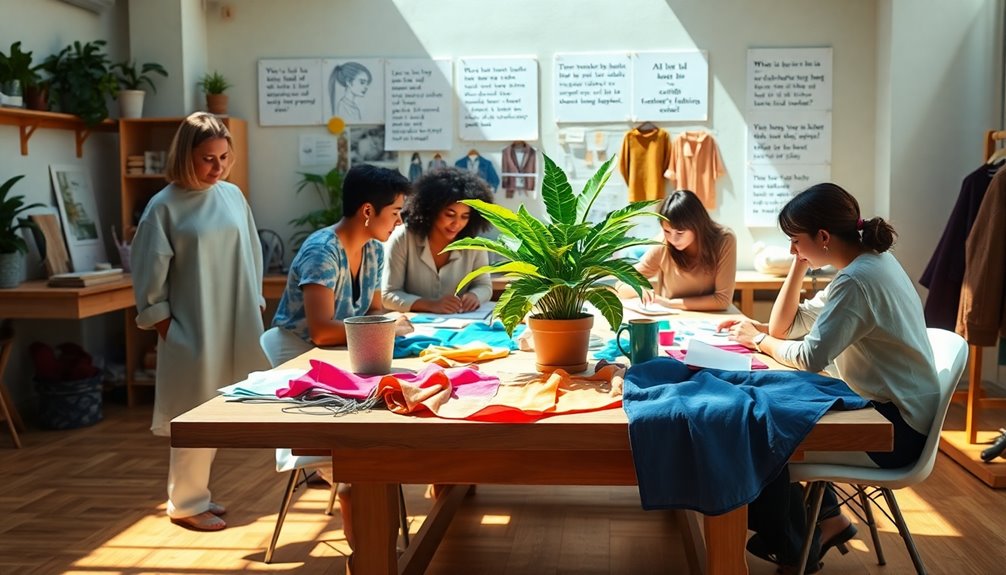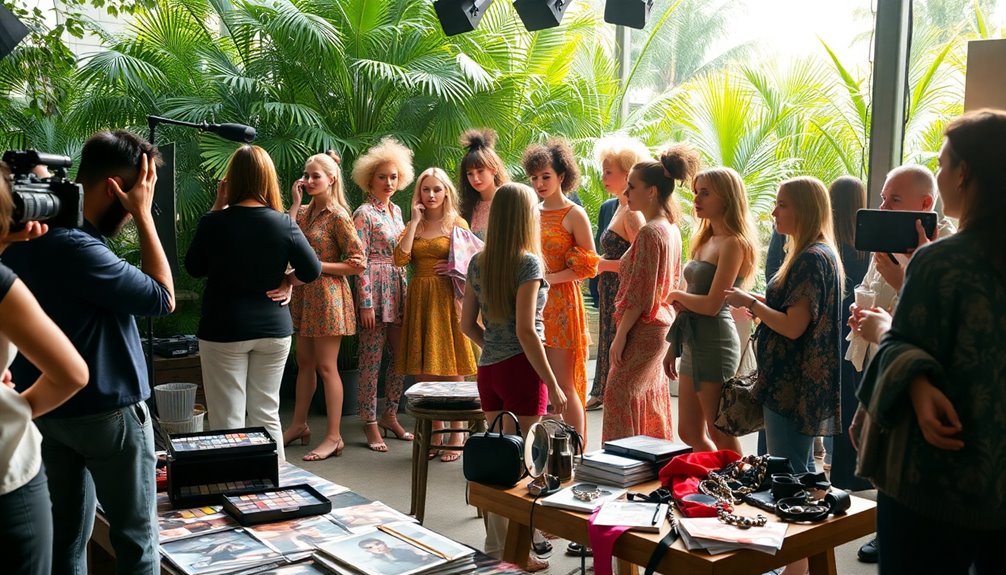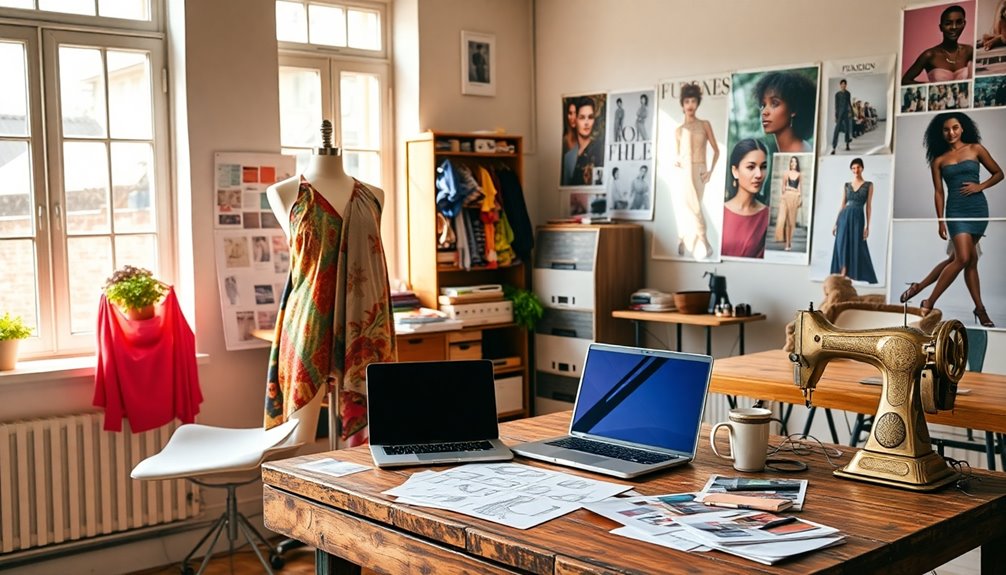If you're eyeing a career in sustainable fashion, you're in luck. The industry is booming, with roles like fashion designer, sustainable product developer, and ethical trade manager offering exciting opportunities. You'll need strong sustainability knowledge and skills like effective communication and analytical thinking. Start by exploring educational programs focused on eco-friendly practices. Don't forget to network at industry events and tailor your job applications to show your passion for sustainability. With the right preparation and a proactive approach, you're well on your way to making a positive impact in the fashion world. There's so much more to explore about this exciting field.
Key Takeaways
- Explore various sustainable fashion roles such as designer, product developer, or sustainability manager to find your niche in the field.
- Focus on building essential skills like supply chain management, marketing, and a strong foundation in sustainability knowledge.
- Pursue relevant education and training from institutions that emphasize sustainable fashion, such as California College of the Arts or the Centre for Sustainable Fashion.
- Stay updated on market trends and consumer preferences regarding eco-friendly products to align your career goals with industry demands.
- Network through industry conferences and workshops to establish connections and enhance your career opportunities in sustainable fashion.
Types of Sustainable Fashion Jobs
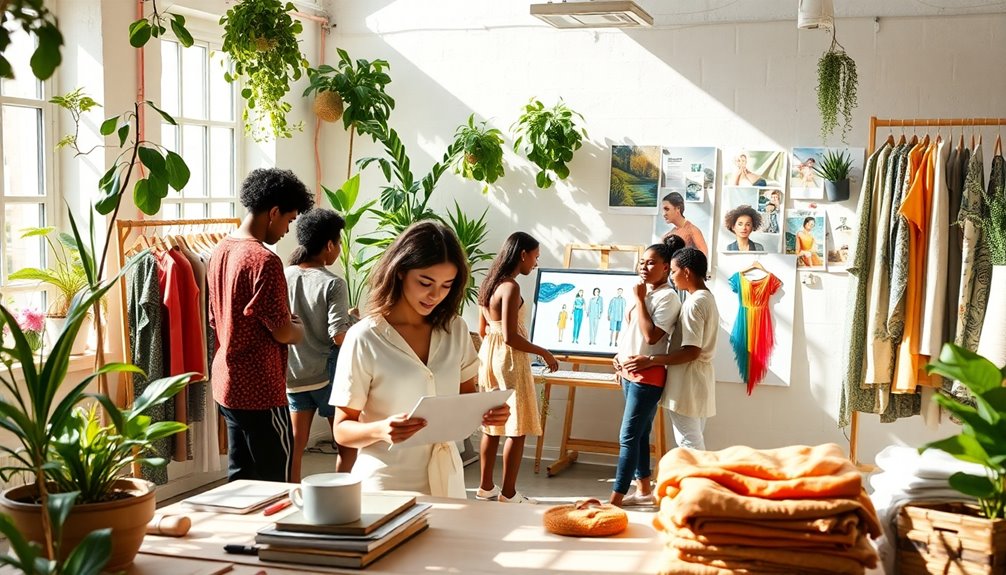
Sustainable fashion jobs are transforming the industry by integrating eco-friendly practices and ethical standards into various roles. If you're passionate about making a difference, you might consider becoming a fashion designer, where you'll focus on trend analysis and create garments from sustainable fabrics.
As a sustainable product developer, you'd manage the entire product development process, ensuring innovation aligns with sustainability. This role is increasingly important as consumer demand for reduced environmental footprints continues to rise.
Another option is to become a sustainable textile specialist, concentrating on eco-friendly materials essential for production. You could also take on the role of a pattern maker, crafting patterns that minimize waste using sustainable techniques.
Garment technologists play a crucial role too, ensuring that all garments meet sustainability standards.
If you lean towards supply chain management, positions like an ethical trade manager or sustainable sourcing manager might interest you. They research and establish relationships with ethical suppliers, ensuring all materials are sustainably sourced.
In marketing, you could promote sustainable fashion as a sustainability marketing specialist or manage branding strategies as a brand manager.
With diverse roles available, you can find a path that aligns with your values and skills in this growing field.
Key Responsibilities in the Field
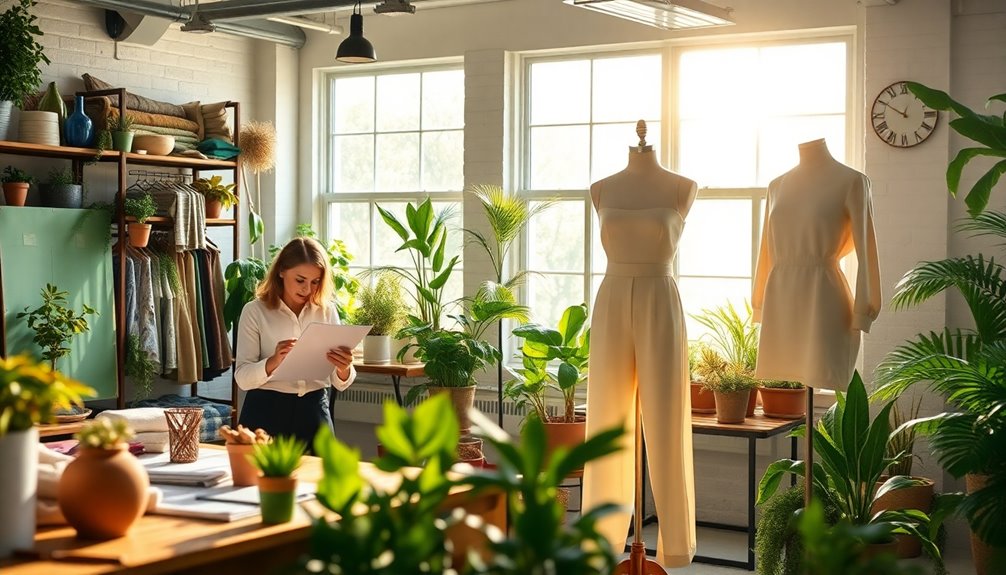
As you delve into the realm of sustainable fashion, you'll discover that each role comes with distinct responsibilities that contribute to a more ethical industry.
In design and production, you'll focus on creating eco-friendly and ethically produced clothing, developing creative concepts, and crafting detailed sketches. You'll also select sustainable fabrics and materials, influencing consumers to embrace eco-conscious choices through your designs. Additionally, you'll need to understand the entire lifecycle of fashion, from design to disposal, to ensure your creations have a minimal environmental impact.
In supply chain management, you'll identify and manage sustainable suppliers, ensuring they deliver quality materials on time. Coordinating transportation and overseeing warehousing will be crucial, along with addressing any quality issues or compliance concerns.
Marketing and branding roles involve promoting sustainable brands and educating consumers about ethical fashion. You'll brainstorm and execute campaigns while analyzing market trends to determine which sustainable products to feature.
In retail and merchandising, your responsibilities include developing strategies to sell eco-friendly products and managing stock within a sustainable category. By analyzing sales data, you'll help predict future demand and ensure retail operations align with sustainability goals.
Each of these roles plays a vital part in advancing the sustainable fashion movement.
Essential Skills and Qualifications
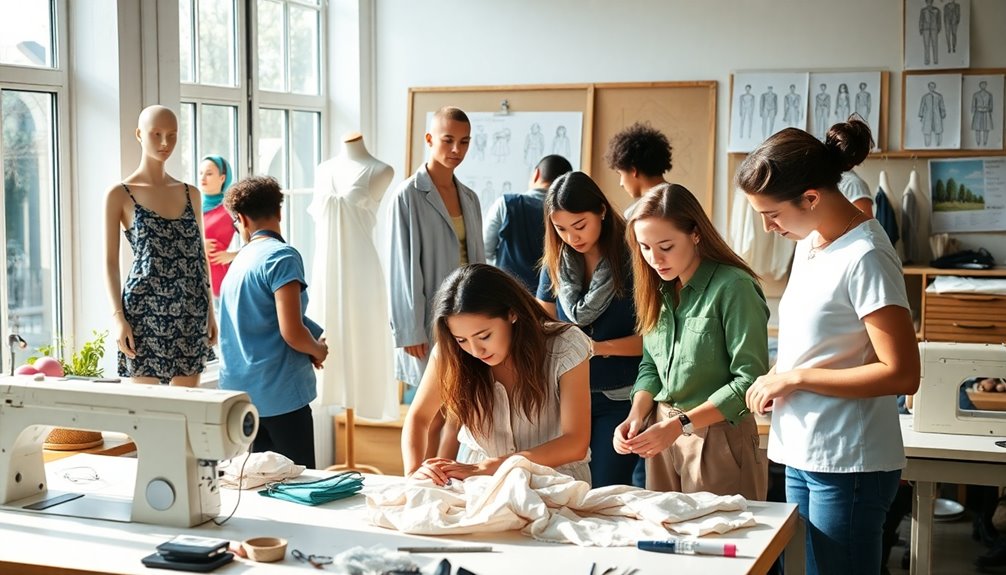
In the world of sustainable fashion, having the right skills and qualifications can set you apart in a competitive job market. To excel, you'll need a solid foundation in sustainability knowledge, including familiarity with sustainable materials and manufacturing processes. Understanding the environmental and social impacts of the fashion industry is crucial, as is expertise in supply chain management and waste reduction strategies.
Analytical and problem-solving abilities are also essential. You should be able to conduct thorough research, analyze data to pinpoint areas for improvement, and develop sustainable strategies. Identifying inefficiencies and implementing circular economy practices will enhance your effectiveness in this field. Furthermore, being proficient in analyzing sustainability metrics will allow you to make informed decisions that promote green initiatives.
Effective communication and collaboration skills are key. You'll need to convey findings and recommendations clearly, work with various stakeholders, and build positive relationships with suppliers. Engaging in industry events will also help you stay connected. Lastly, knowledge of certifications like GOTS and OEKO-TEX Standard 100, along with compliance with Fair Trade standards, is vital. Understanding ethical production practices will ensure you contribute to minimizing environmental impact and promoting fair labor practices in the industry.
Education and Training Options
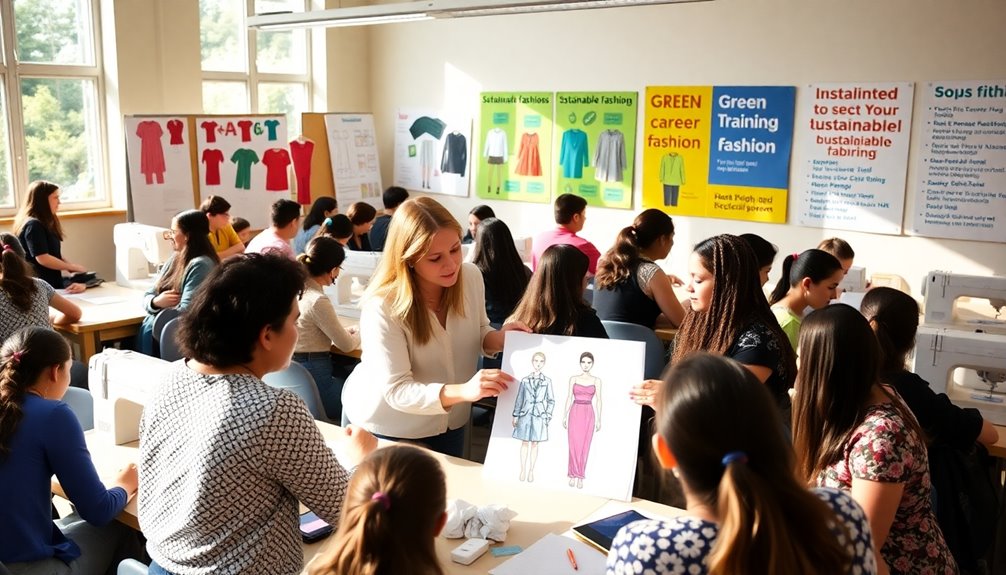
Exploring education and training options in sustainable fashion can open doors to a fulfilling career in an increasingly eco-conscious industry. You'll find various programs tailored to equip you with the skills needed to thrive.
For instance, the California College of the Arts offers a B.A. in Fashion Design and a unique M.B.A. in Design Strategy, both emphasizing sustainability. If you're interested in a hands-on approach, Rocky Mountain College of Art + Design features courses like Intro to Sustainable Fashion Design and Sustainable Construction Techniques.
Anant National University provides a comprehensive curriculum that includes garment construction and sustainable business practices. The International Fashion Academy Paris focuses on sustainable sourcing and textile processing through its Bachelor's in Fashion Sustainability. Additionally, students will learn about the impact of 85% of textiles that end up in landfills, reinforcing the importance of sustainable practices.
To deepen your knowledge, consider specialized courses such as Sustainable Material + Fashion Strategies at RMCAD or Textile Sustainability and Innovation at the University of Leeds. Engaging in practical experiences, like laboratory research or innovation studios, can enhance your learning significantly.
Don't overlook additional resources from the Centre for Sustainable Fashion that offer online courses and valuable partnerships. With the right education, you're well on your way to making a positive impact in the fashion industry.
Market Trends and Growth Insights

With the right education and training in sustainable fashion, you're entering a vibrant market ripe with opportunities. The global sustainable fashion market, valued at $7.8 billion in 2023, is projected to soar to $33.05 billion by 2030, growing at an impressive CAGR of 22.9%. This growth is driven by rising consumer demand for eco-friendly fabrics and a shift toward ethically sourced apparel.
As consumers become more aware of environmental sustainability and social responsibility, they increasingly prefer sustainable clothing options. This trend spans both men's and women's fashion, with men's sustainable fashion showing notable growth. Additionally, the rise in environmentally-conscious consumer demand is prompting brands to adopt more sustainable practices.
Online retail is also becoming a dominant distribution channel, catering to evolving shopping preferences.
Technological innovations are playing a crucial role as well, introducing smart clothing, blockchain for transparency, and lab-grown fabrics. Circular fashion practices, emphasizing reuse and recycling, are gaining traction, with brands implementing take-back programs and repair services.
While only 12% of clothing is currently recycled globally, there's a strong push to increase this rate. By tapping into these trends, you can position yourself for success in a fast-growing and impactful industry.
Opportunities in Sustainable Fashion

If you're drawn to creativity, consider becoming a fashion designer, where you'll analyze trends and design ethical clothing using sustainable fabrics. Alternatively, a sustainable product developer ensures innovation in product development while collaborating with teams and suppliers.
If you have a knack for textiles, a sustainable textile specialist focuses on quality and environmental impact, while roles in product innovation work on developing new sustainable materials. Additionally, the sustainable fashion market has expanded significantly in recent years, creating more opportunities for aspiring professionals.
For those interested in supply chain dynamics, positions like ethical trade manager and sustainable sourcing roles emphasize maintaining relationships with suppliers and ensuring compliance with sustainability standards.
Marketing and retail offer exciting prospects too. As a sustainable fashion buyer or marketing specialist, you'll promote eco-friendly products and educate consumers about ethical choices.
Corporate roles, such as sustainability manager, allow you to oversee social responsibility initiatives, ensuring they align with sustainability goals. Each of these positions contributes to a thriving, responsible fashion industry, making your work impactful and fulfilling.
Challenges Facing the Industry
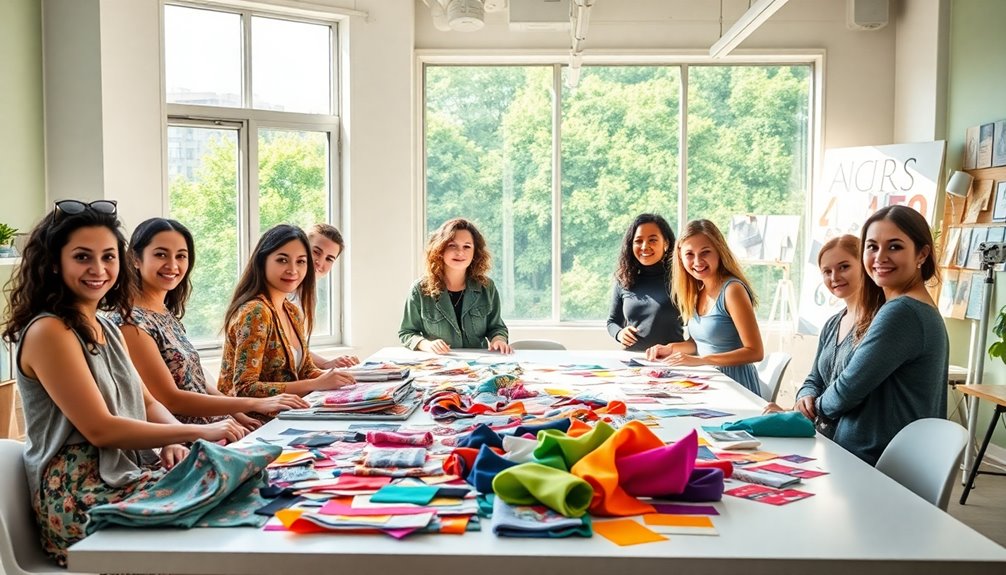
The sustainable fashion industry faces a myriad of challenges that can hinder its growth and impact. One major hurdle is the increasing costs of raw materials, which affect the entire clothing sector. You might find that sourcing eco-friendly alternatives isn't just difficult; it often comes at a premium, making sustainable clothing less affordable for consumers. Furthermore, the rising costs of raw materials can create financial strain that impacts production budgets and pricing strategies.
Additionally, the fashion industry ranks second in environmental pollution, trailing only behind oil. The lack of technological solutions for garment recycling means that a significant percentage of clothing isn't recycled, limiting efforts toward sustainability. You'll also notice that designing products for recirculation is crucial, yet it remains underdeveloped.
Labor and ethical issues further complicate the landscape. Many workers face low wages and poor working conditions, resulting in substandard products. It's essential to advocate for better treatment and pay to enhance product quality and sustainability.
Lastly, logistical challenges arise from complex global supply chains. You might encounter high upfront costs for setting up sustainable networks and difficulties in collecting raw materials from various sources. Evaluating suppliers based on sustainability metrics is vital, but it can be a daunting task.
Steps to Secure a Job

Securing a job in sustainable fashion requires strategic planning and proactive engagement. Start by identifying brands that align with your values. Check their career pages frequently, as openings often aren't listed on general job boards. Use specific keywords like "sustainable fashion" or "eco-fashion" to enhance your job search.
Set up job alerts on platforms like Google and LinkedIn to receive notifications about new postings. Don't forget to explore specialized job boards and industry-specific sites for additional opportunities. Your university's career center can also be a valuable resource. Additionally, keep in mind that corporate sustainability roles may recruit up to a year in advance, so plan your search accordingly.
When it comes to applications, tailor your resume and cover letter to match job descriptions. Incorporate relevant keywords and ensure your qualifications meet 80-90% of the requirements. In your Career Summary, include the position name to grab attention.
Prepare for interviews by practicing responses to behavioral questions using the S.T.A.R. method. Familiarize yourself with potential technical questions relevant to the role.
Lastly, follow up after interviews to express your enthusiasm for the position, and engage with companies on social media to strengthen your candidacy.
Networking and Industry Engagement

Building a strong network in the sustainable fashion industry can significantly enhance your job prospects and professional growth. Start by attending key industry conferences like the AAFA Traceability & Sustainability Conference and the Global Fashion Summit. These events allow you to meet and connect with industry professionals who share your passion for sustainability.
Utilize online platforms and virtual events, such as Fashionablyin London, to network with suppliers, agents, and buyers globally. Engage with leaders during events like Fashion Revolution Week to deepen your understanding of industry practices.
Workshops and panel discussions at Eco Fashion Week offer invaluable opportunities to interact with experts and gain insights. Trade shows like Dutch Sustainable Fashion Week and the Ethical Fashion Show Berlin also provide networking opportunities with sustainable brands. Moreover, participating in the Better Cotton Conference allows you to connect with those committed to cotton sustainability and community support.
Additionally, join communities like FashionUnited to stay updated and connect with other professionals. Collaborate with organizations prioritizing sustainability, and engage in initiatives such as the Better Cotton Conference to broaden your reach.
Lastly, don't overlook educational events; they're great for learning and networking. By actively participating in these spaces, you'll build relationships that can lead to exciting new career opportunities.
Frequently Asked Questions
What Are the Salary Ranges for Sustainable Fashion Jobs?
When you look into salary ranges for sustainable fashion jobs, you'll find that entry-level positions start around $55,955 annually.
As you gain experience, the national average jumps to about $77,576, with senior roles earning up to $106,955.
Factors like your location, type of employer, and specific industry segment can greatly influence your pay.
Are Remote Positions Available in Sustainable Fashion?
Yes, remote positions are definitely available in sustainable fashion.
You can find roles like Sustainability Advisor, Operations Specialist, and Recruiter on job boards such as Indeed, LinkedIn, and specialized platforms like Kyna Intel.
The industry's shift to digital has opened up global opportunities, allowing you to work from anywhere.
Just remember to filter your searches effectively to discover the right positions that align with your skills and sustainability goals.
How Can I Transition From Traditional Fashion to Sustainable Fashion?
To transition from traditional fashion to sustainable fashion, start by educating yourself on eco-friendly materials and ethical production practices.
Take courses in sustainability and consider internships with brands focused on green practices.
Network with professionals in the sustainable fashion sector to gain insights and build connections.
You should also familiarize yourself with the circular economy and incorporate those principles into your design process.
This shift can enhance your skills and align your values with your work.
What Are Common Career Paths in Sustainable Fashion?
In sustainable fashion, common career paths include roles like fashion designer, sustainable product developer, and sustainable sourcing manager. Other fashion career paths within sustainable fashion include marketing and communication roles focusing on sustainability, as well as supply chain management positions that oversee ethical and sustainable production practices. In addition, there is a growing demand for experts in sustainable fashion consulting and advocacy, providing opportunities for those with a passion for both fashion and environmental responsibility. Overall, the range of fashion career paths within the sustainable fashion industry continues to expand as the need for more sustainable practices becomes increasingly important.
You could also explore positions in marketing, such as sustainable buyer or CSR consultant, where you promote eco-friendly practices.
Consulting and advocacy roles, like sustainability manager or advocate, are great for those looking to implement change.
Each path emphasizes creativity and innovation while prioritizing environmental responsibility, allowing you to make a meaningful impact in the industry.
Which Companies Are Leaders in Sustainable Fashion Practices?
When you're exploring leaders in sustainable fashion practices, companies like EILEEN FISHER, People Tree, and Patagonia stand out. They prioritize ethical sourcing, eco-friendly materials, and fair labor practices.
Amour Vert and Stella McCartney also focus on innovative, sustainable production methods. Brands like Vestiaire Collective promote circular fashion, encouraging second-hand shopping to reduce waste.
Conclusion
In conclusion, pursuing a career in sustainable fashion offers you a chance to make a meaningful impact while working in a dynamic industry. By understanding the various job roles, honing essential skills, and staying informed about market trends, you can position yourself for success. Don't forget to network and engage with industry professionals to uncover opportunities. With passion and dedication, you can contribute to a greener future in style. Start your journey today!
